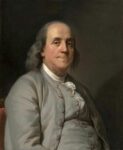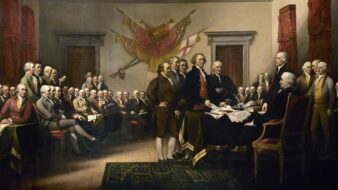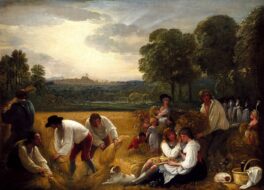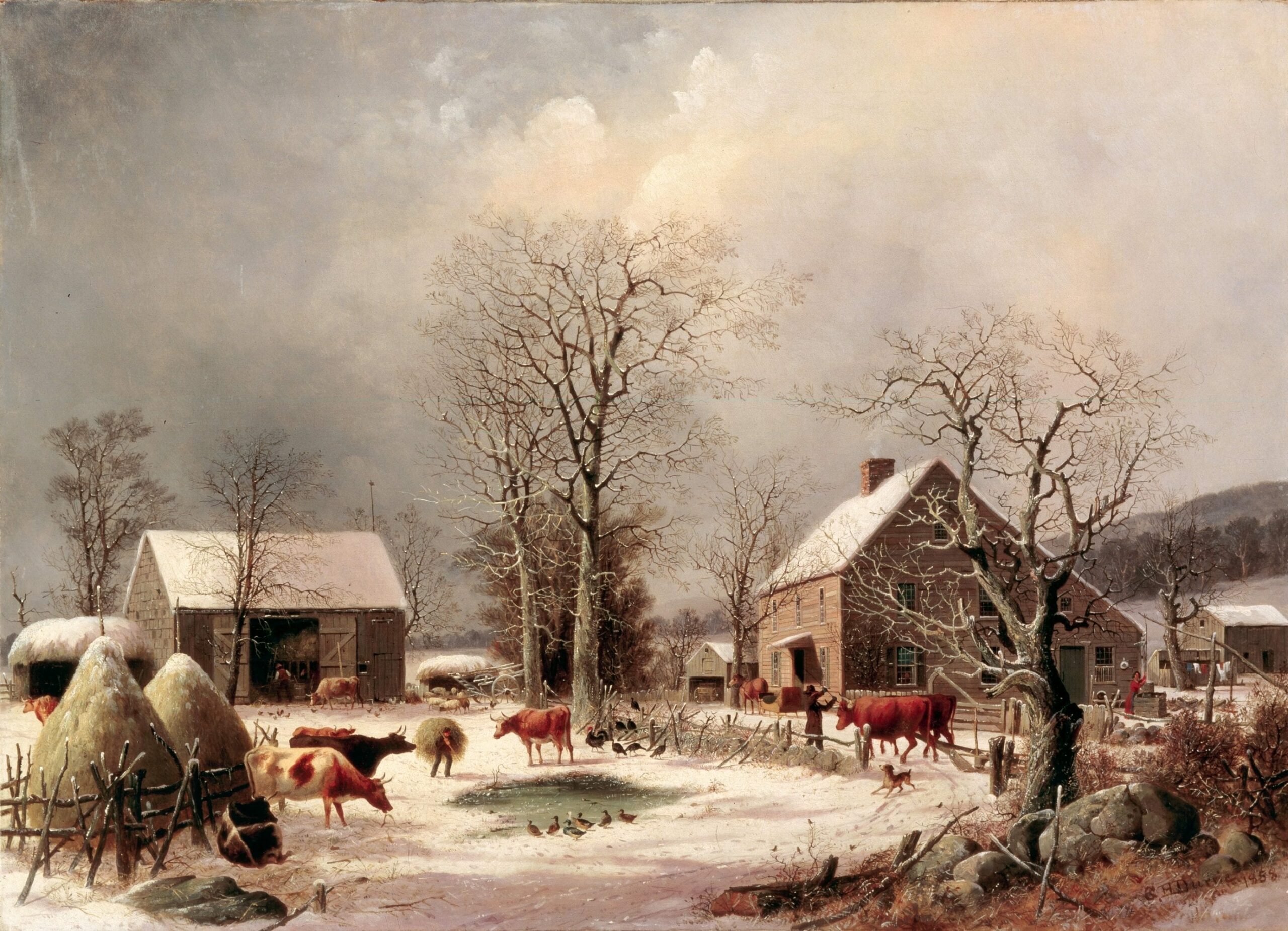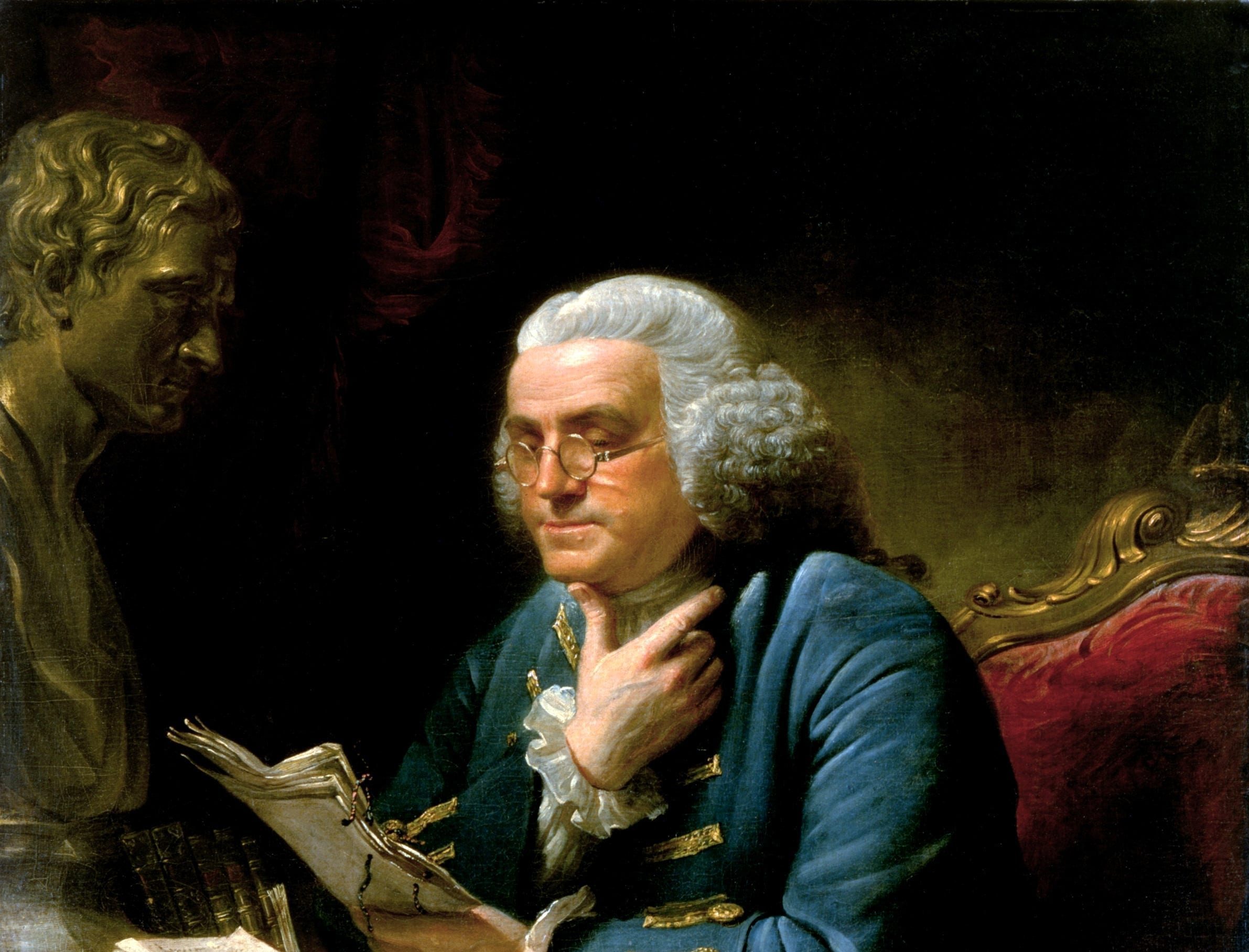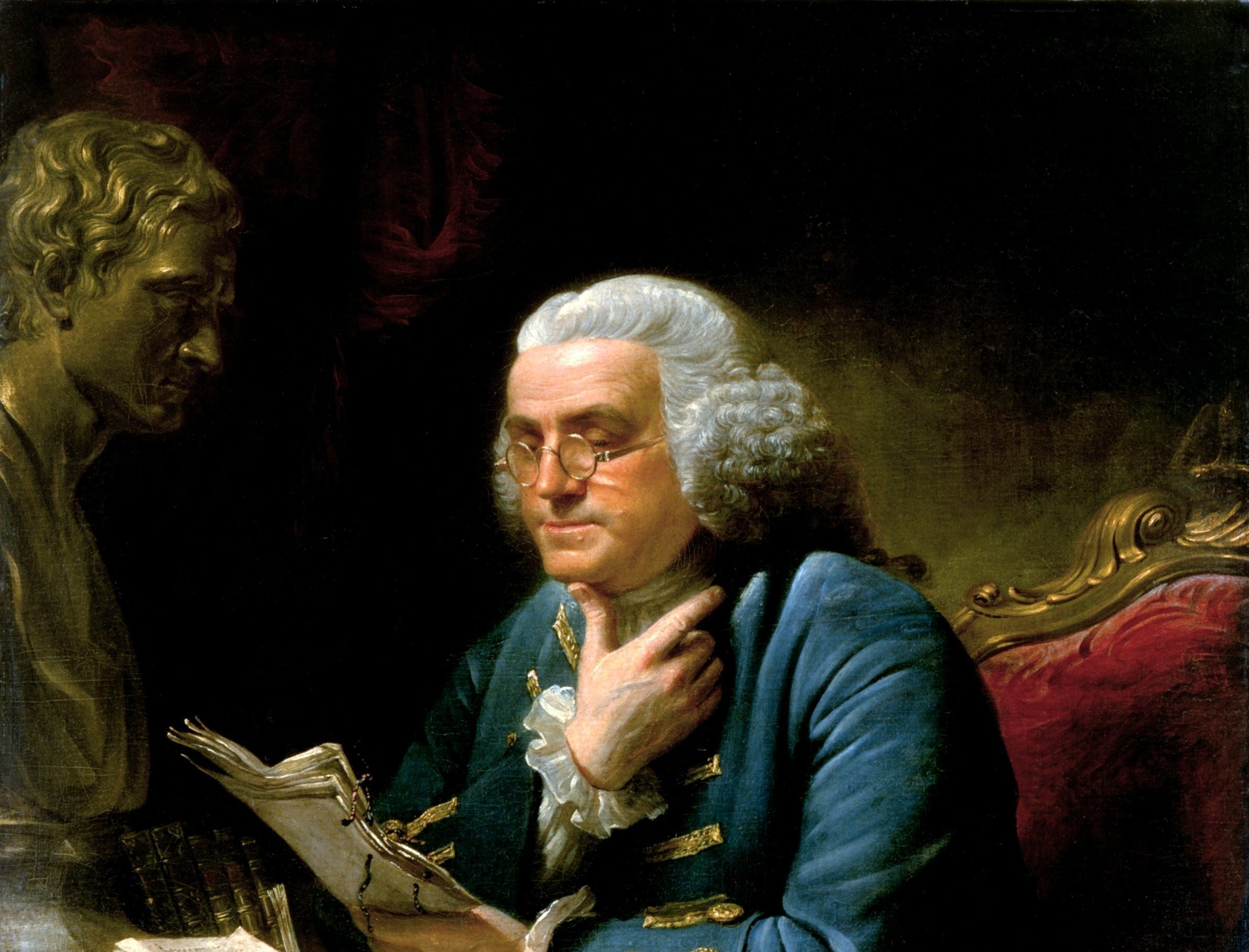
No related resources
Introduction
In the spring of 1776, talk of independence had not yet transformed the common understanding that the struggle against Britain was an effort to defend colonists’ rights as Englishmen. But what about the rights of America’s Englishwomen? What about the rights of people of African descent and Native Americans? These uncomfortable questions could be applied not only to natural rights (such as the freedom from harm to one’s life, liberty, and property), but even to civil rights (such as the rights to vote and hold office) related to government decision-making. Maybe nowhere else were these vexing questions more intelligently discussed than in this series of letters written by Abigail Adams (1744–1818) and her husband, Massachusetts Continental Congress delegate John Adams (1735–1826).
Abigail Adams’s seemingly sincere insistence that Congress “remember the ladies” when making new laws, John Adams’s seemingly ham-handed initial response, and his May 1776 message to Massachusetts jurist James Sullivan (1744–1808) highlight the complexity of Americans’ thoughts regarding the ends and means of government. While Abigail Adams’s letters provided evidence of what Sullivan described, in a May 9 letter, as a “leveling spirit” promoting greater equality, John Adams’s letters caution that too much equality could undermine liberty. Given the uncertain experiment in collective self-government on which Americans were about to embark, did it make sense to hand the reins of power to men, women, or even children who lacked the means to fully govern themselves?
Sources: Abigail Adams to John Adams, March 31, 1776, Founders Online, National Archives, https://founders.archives.gov/documents/Adams/04-01-02-0241; J. Adams to A. Adams, April 14, 1776, Founders Online, National Archives, https://founders.archives.gov/documents/Adams/04-01-02-0248; A. Adams to J. Adams, May 7, 1776, Founders Online, National Archives, https://founders.archives.gov/documents/Adams/04-01-02-0259; J. Adams to James Sullivan, May 26, 1776, Founders Online, National Archives, https://founders.archives.gov/documents/Adams/06-04-02-0091.
Abigail Adams to John Adams | Braintree, Mass., March 31, 1776
I wish you would ever write me a letter half as long as I write you, and tell me, if you may, where your fleet are gone? What sort of defense Virginia can make against our common enemy? Whether it is so situated as to make an able defense? Are not the gentry lords and the common people vassals, are they not like the uncivilized natives Britain represents us to be? I hope their riflemen, who have shown themselves very savage and even bloodthirsty, are not a specimen of the generality of the people.
I am willing to allow the colony great merit for having produced a Washington but they have been shamefully duped by a Dunmore.[1]
I have sometimes been ready to think that the passion for liberty cannot be equally strong in the breasts of those who have been accustomed to deprive their fellow creatures of theirs. Of this I am certain that it is not founded upon that generous and Christian principle of doing to others as we would that others should do unto us….
I long to hear that you have declared an independency—and by the way, in the new code of laws which I suppose it will be necessary for you to make, I desire you would remember the ladies, and be more generous and favorable to them than your ancestors. Do not put such unlimited power into the hands of the husbands. Remember, all men would be tyrants if they could. If particular care and attention is not paid to the ladies, we are determined to foment a rebellion, and will not hold ourselves bound by any laws in which we have no voice, or representation.
That your sex are naturally tyrannical is a truth so thoroughly established as to admit of no dispute, but such of you as wish to be happy willingly give up the harsh title of master for the more tender and endearing one of friend. Why then, not put it out of the power of the vicious and the lawless to use us with cruelty and indignity with impunity. Men of sense in all ages abhor those customs which treat us only as the vassals of your sex. Regard us then as beings placed by providence under your protection and, in imitation of the Supreme Being, make use of that power only for our happiness….
John Adams to Abigail Adams | Philadelphia, April 14, 1776
…As to your extraordinary code of laws, I cannot but laugh. We have been told that our struggle has loosened the bands of government everywhere. That children and apprentices were disobedient—that schools and colleges were grown turbulent, that Indians slighted their guardians, and Negroes grew insolent to their masters. But your letter was the first intimation that another tribe, more numerous and powerful than all the rest, were grown discontented. This is rather too coarse a compliment but you are so saucy, I won’t blot it out.
Depend upon it, we know better than to repeal our masculine systems. Although they are in full force, you know they are little more than theory. We dare not exert our power in its full latitude. We are obliged to go fair, and softly, and in practice, you know we are the subjects. We have only the name of masters, and rather than give up this, which would completely subject us to the despotism of the petticoat, I hope General Washington, and all our brave heroes would fight. I am sure every good politician would plot, as long as he would against despotism, empire, monarchy, aristocracy, oligarchy, or ochlocracy.[2] A fine story indeed. I begin to think the ministry as deep as they are wicked. After stirring up Tories, land-jobbers, trimmers, bigots, Canadians, Indians, Negroes, Hanoverians, Hessians, Russians, Irish Roman Catholics, Scotch renegades, at last they have stimulated them to demand new privileges and threaten to rebel.
Abigail Adams to John Adams | Braintree, Mass., May 7, 1776
How many are the solitary hours I spend, ruminating upon the past, and anticipating the future, whilst you, overwhelmed with the cares of state, have but few moments you can devote to any individual. All domestic pleasures and enjoyments are absorbed in the great and important duty you owe your country, “for our country is as it were a secondary God, and the first and greatest parent. It is to be preferred to parents, wives, children, friends, and all things—the Gods only accepted. For if our country perishes it is as impossible to save an individual, as to preserve one of the fingers of a mortified hand.”[3] Thus do I suppress every wish, and silence every murmur, acquiescing in a painful separation from the companion of my youth, and the friend of my heart….
A government of more stability is much wanted in this colony, and they are ready to receive it from the hands of the Congress, and since I have begun with maxims of state I will add another: that a people may let a king fall, yet still remain a people, but if a king let his people slip from him, he is no longer a king. And as this is most certainly our case, why not proclaim to the world in decisive terms your own importance?
Shall we not be despised by foreign powers for hesitating so long at a word?
I cannot say that I think you very generous to the ladies, for whilst you are proclaiming peace and good will to men, emancipating all nations, you insist upon retaining an absolute power over wives. But you must remember that arbitrary power is like most other things which are very hard, very liable to be broken—and notwithstanding all your wise laws and maxims we have it in our power not only to free ourselves but to subdue our masters, and without violence throw both your natural and legal authority at our feet—
Charm by accepting, by submitting sway
Yet have our humor most when we obey….
John Adams to James Sullivan | Philadelphia, May 26, 1776
Your favors of May 9th. and 17th. are now before me; and I consider them as the commencement of a correspondence, which will not only give me pleasure, but may be of service to the public, as, in my present station I stand in need of the best intelligence, and the advice of every gentleman of abilities and public principles in the colony which has seen fit to place me here.
Our worthy friend, Mr. Gerry,[4] has put into my hand, a letter from you, of the sixth of May, in which you consider the principles of representation and legislation, and give us hints of some alterations, which you seem to think necessary, in the qualification of voters.
I wish, sir, I could possibly find time, to accompany you, in your investigation of the principles upon which a representative assembly stands and ought to stand, and in your examination whether the practice of our colony, has been conformable to those principles. But alas! Sir, my time is so incessantly engrossed by the business before me that I cannot spare enough, to go through so large a field; and as to books, it is not easy to obtain them here, nor could I find a moment to look into them, if I had them.
It is certain, in theory, that the only moral foundation of government is the consent of the people. But to what an extent shall we carry this principle? Shall we say, that every individual of the community, old and young, male and female, as well as rich and poor, must consent, expressly, to every act of legislation? No, you will say. This is impossible. How then does the right arise in the majority to govern the minority, against their will? Whence arises the right of the men to govern women, without their consent? Whence the right of the old to bind the young, without theirs?
But let us first suppose, that the whole community of every age, rank, sex, and condition, has a right to vote. This community is assembled—a motion is made and carried by a majority of one voice. The minority will not agree to this. Whence arises the right of the majority to govern, and the obligation of the minority to obey? From necessity, you will say, because there can be no other rule. But why exclude women? You will say, because their delicacy renders them unfit for practice and experience, in the great business of life, and the hardy enterprises of war, as well as the arduous cares of state. Besides, their attention is so much engaged with the necessary nurture of their children, that nature has made them fittest for domestic cares. And children have not judgment or will of their own. True. But will not these reasons apply to others? Is it not equally true, that men in general in every society, who are wholly destitute of property, are also too little acquainted with public affairs to form a right judgment, and too dependent upon other men to have a will of their own? If this is a fact, if you give to every man, who has no property, a vote, will you not make a fine encouraging provision for corruption by your fundamental law? Such is the frailty of the human heart, that very few men, who have no property, have any judgment of their own. They talk and vote as they are directed by some man of property, who has attached their minds to his interest.
Upon my word, sir, I have long thought an army, a piece of clockwork and to be governed only by principles and maxims, as fixed as any in mechanics, and by all that I have read in the history of mankind, and in authors, who have speculated upon society and government, I am much inclined to think, a government must manage a society in the same manner; and that this is machinery too.
Harrington[5] has shown that power always follows property. This I believe to be as infallible a maxim, in politics, as, that action and re-action are equal, is in mechanics. Nay I believe we may advance one step farther and affirm that the balance of power in a society, accompanies the balance of property in land. The only possible way then of preserving the balance of power on the side of equal liberty and public virtue, is to make the acquisition of land easy to every member of society; to make a division of the land into small quantities, so that the multitude may be possessed of landed estates. If the multitude is possessed of the balance of real estate, the multitude will have the balance of power, and in that case the multitude will take care of the liberty, virtue, and interest of the multitude in all acts of government.
I believe these principles have been felt, if not understood, in the Massachusetts Bay [colony], from the beginning; and therefore I should think that wisdom and policy would dictate, in these times, to be very cautious of making alterations. Our people have never been very rigid in scrutinizing into the qualifications of voters, and I presume they will not now begin to be so. But I would not advise them to make any alteration in the laws, at present, respecting the qualifications of voters.
Your idea, that those laws, which affect the lives and personal liberty of all, or which inflict corporal punishment, affect those, who are not qualified to vote, as well as those who are, is just. But, so they do women, as well as men, children as well as adults. What reason should there be, for excluding a man of twenty years, eleven months and twenty-seven days old, from a vote when you admit one, who is twenty-one? The reason is, you must fix upon some period in life, when the understanding and will of men in general is fit to be trusted by the public. Will not the same reason justify the state in fixing upon some certain quantity of property as a qualification?
The same reasoning, which will induce you to admit all men, who have no property, to vote, with those who have, for those laws, which affect the person will prove that you ought to admit women and children…. Generally speaking, women and children have as good judgment, and as independent minds, as those men who are wholly destitute of property—these last being to all intents and purposes as much dependent upon others, who will please to feed, clothe, and employ them, as women are upon their husbands, or children on their parents.
As to your idea, of proportioning the votes of men in money matters, to the property they hold, it is utterly impracticable. There is no possible way of ascertaining, at any one time, how much every man in a community is worth; and if there was, so fluctuating is trade and property, that this state of it, would change in half an hour. The property of the whole community is shifting every hour, and no record can be kept of the changes.
Society can be governed only by general rules. Government cannot accommodate itself to every particular case, as it happens, nor to the circumstances of particular persons. It must establish general, comprehensive regulations for cases and persons. The only question is, which general rule will accommodate most cases and most persons?
Depend upon it, sir, it is dangerous to open so fruitful a source of controversy and altercation, as would be opened by attempting to alter the qualifications of voters. There will be no end of it. New claims will arise. Women will demand a vote. Lads from 12 to 21 will think their rights not enough attended to, and every man, who has not a farthing, will demand an equal voice with any other in all acts of state. It tends to confound and destroy all distinctions, and prostrate all ranks, to one common level.
- 1. Lord John Murray (1730–1809), Earl of Dunmore, last royal governor of Virginia, who reportedly duped the residents of Williamsburg into leaving their powder supplies unguarded (allowing them to be taken for the crown), and who infamously issued a proclamation promising freedom to any enslaved man belonging to a Patriot who would abandon his master and fight for the British.
- 2. Government by mob rule.
- 3. Adams was apparently quoting the second-century Stoic philosopher Hierocles, although in the eighteenth century his fragments were attributed to earlier philosophers.
- 4. Elbridge Gerry (1744–1814), a fellow delegate from Massachusetts to the Continental Congress.
- 5. James Harrington (1611–1677) was an English political theorist whose republican ideals were influential in the resistance to the Stuart monarchy.
Thoughts on Government
April, 1776
Conversation-based seminars for collegial PD, one-day and multi-day seminars, graduate credit seminars (MA degree), online and in-person.
